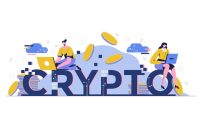
DeFi coins are crucial to the fast-expanding realm of decentralized finance (DeFi). These crypto assets are famous for their distinct characteristics and prospects. DeFi tokens are programmable assets that power the DeFi ecosystem’s decentralized apps. These currencies run on blockchain systems like Ethereum and provide many decentralized financial activities. From governance tokens that give users voting rights in DeFi protocols to stablecoins that keep a stable value, DeFi tokens are the lifeblood of the DeFi sector, letting users access a variety of financial services.
The Basics Of Defi Tokens
Decentralized finance relies on blockchain-based DeFi coins. They may be programmed to perform particular DeFi application tasks, unlike regular cryptocurrencies. Most DeFi coins use Ethereum smart contracts to automate and safeguard financial activities. Stablecoins, governance tokens, and utility tokens serve different purposes in the DeFi ecosystem. DeFi tokens may be programmed for lending, borrowing, yield farming, and decentralized trade.
The Defi Ecosystem
DeFi is a smart contract and decentralized financial ecosystem, not only tokens. DeFi’s mission is to provide lending, borrowing, and trading without banks or brokerage businesses. This method removes middlemen and promotes transparent, auditable, intelligent contracts. DeFi’s decentralization is changing the financial environment, giving consumers greater control over their assets and access to a worldwide, permissionless financial system.
Popular Defi Tokens
Popular Defi Coins Lead The Decentralized Financial Revolution, Each Playing A Distinct Function. Some Popular Defi Tokens Are Described Below:
- Chainlink (LINK): The decentralized oracle network needs Chainlink’s LINK coin. Connecting smart contracts with real-world data allows safe, tamper-proof, and accurate blockchain data flow.
- Uniswap (UNI): UNI is the governance token of the premier decentralized exchange. UNI holders may vote on platform governance, and liquidity providers are paid.
- Aave (AAVE): Aave lenders’ governance and utility token. Users may vote on protocol modifications and get fee savings.
- Compound (COMP): Compound, a lending and borrowing DeFi protocol, governs using COMP. Holders may propose and vote on platform modifications.
- MakerDAO (DAI): MakerDAO controls DAI, a stablecoin. Assets back it, and Maker (MKR) token holders own it. DAI is stable and popular in DeFi.
- Yearnfinance (YFI): The governance token for the platform. Votes on proposals and protocol strategy choices are made here.
7. Synthetix (SNX): Synthetix, a DeFi platform for synthetic asset creation and trading, uses SNX as its native token. SNX tokens may be collateral.
- SushiSwap (SUSHI): The governance token of the decentralized exchange and automated market maker. SUSHI holders may regulate the protocol and gain prizes.
Risks And Challenges
Despite its potential, DeFi faces dangers and limitations. Smart contract security, hackers, and vulnerabilities are significant problems. Rapid DeFi project development may lead to inadequate security audits, putting consumers at risk. DeFi participants face legal and compliance concerns due to unclear regulatory monitoring in various countries. DeFi token prices might also fluctuate due to the space’s instability.
Future Trends And Developments
DeFi is constantly changing. Yield farming, DEXs, and synthetic assets are changing DeFi. DeFi initiatives are researching integration with conventional financial infrastructure. This cross-pollination might boost DeFi adoption and bridge the gap between traditional banking and the blockchain-based ecosystem.
How To Get Started With Defi Tokens
1. Select A Suitable Cryptocurrency Wallet:
Select an Ethereum-compatible cryptocurrency wallet. Popular wallets include MetaMask, Trust Wallet, and Ledger Live. When creating or using your purse, safeguard the private key, which gives you access to your cash. You may lose asset control without it.
2. Fund Your Wallet:
You need Ethereum (ETH) or other supported coins to fund your wallet. To pay gas costs in DeFi apps, you’ll need ETH, the main currency.
3. Learn About Decentralized Exchanges (dexs):
Learn about DEXs like Uniswap, SushiSwap, and PancakeSwap. You may trade, exchange, and offer liquidity for DeFi tokens on these platforms. Buying, selling, and exchanging passes on DEXs requires knowledge.
4. Understand Defi Terminology:
DeFi uses unusual words like liquidity pools, yield farming, impermanent loss, and farming incentives. Understanding these terminologies is essential to understanding DeFi. It clarifies talks, project papers, and platform interfaces.
5. Research Defi Projects:
Read more on DeFi protocols before investing or participating. Check whitepapers, team histories, use cases, and community support. Know the project’s objectives, functions, and dangers.
6. Develop A Risk Management Strategy:
A risk management approach is needed since DeFi is variable. To reduce risk, set your investment limit and diversify your portfolio. Only invest what you can lose, and be aware of price changes.
7. Secure Your Investments:
Long-term DeFi assets should be stored securely. Hacks and fraud may be prevented with hardware wallets or offline storage. DeFi phishing sites and copies should be avoided. Verify website URLs and use trusted platforms.
8. Stay Informed:
DeFi is dynamic and changing. Industry news, blogs, and DeFi social media interactions keep you up to date. Keeping up with trends, information, and security procedures is crucial in this fast-paced industry.
9. Practice Responsible Participation:
Be careful while giving money or yield farming for DeFi. Understand temporary loss and make sure the advantages balance the dangers. Start with lesser investments and acquire expertise as you learn DeFi.
10. Monitor Your Investments:
Track your DeFi investments regularly. Prepare to adapt your plan if market circumstances change or a project no longer meets your financial objectives. You can make intelligent DeFi portfolio selections with active monitoring.
Conclusion
DeFi tokens provide a decentralized, programmable finance model that is intriguing in crypto. These potential include security concerns and regulatory uncertainty. Anyone interested in DeFi tokens must remain educated and participate responsibly as the ecosystem evolves and intersects with conventional finance. Participants must adapt and learn to navigate DeFi’s fast-changing universe.






Leave a Reply